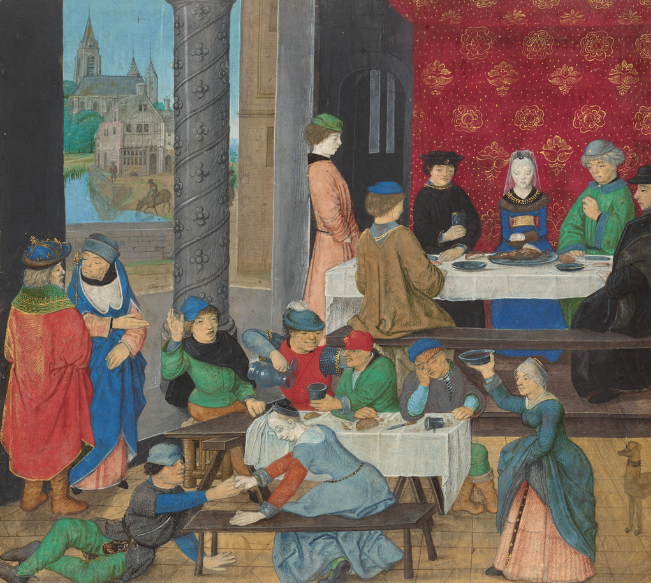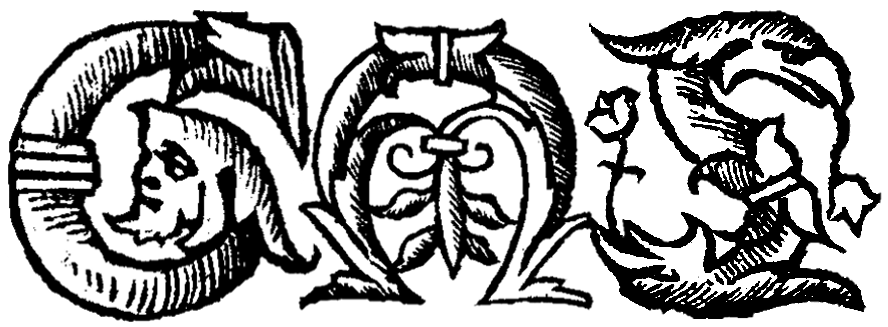Joke 13: The saying of the cook of the famous duke of Milan | Facetia XIII: Dictum Coci Illustrissimo Duci Mediolanensi Habitum

The Temperate and the Intemperate, Master of the Dresden Prayer Book, miniature from Valerius Maximus, The Memorable Deeds and Sayings of the Romans, Bruges, about 1470-80. The J. Paul Getty Museum, Ms. 43, recto
Read the text (PDF)
Introduction to the Text
Gian Francesco Poggio Bracciolini (commonly referred to as simply Poggio Bracciolini) was born in Terranuova (Tuscany) in 1380. He died in Florence in 1459 at the age of seventy-nine. During his long life this early and important humanist had an equally long career at the Papal curia. In the service of a sequence of popes he lived in Rome, travelled with the papal court all across Italy and the rest of Europe.
Poggio produced a wide range of writing during his career (his collected works span four substantial volumes). He often worked in the dialogue form or wrote speeches, but he also wrote history. He was an avid book hunter and a skilled scribe.
Through his texts we also meet a very polemical man, who seems to get into fights with many of his contemporaries, the most famous of which is his conflict with another of the humanist greats, Lorenzo Valla. The collections of jokes and stories known today as the Facetiae, but which Poggio himself preferred to refer to as Conversations ( Confabulationes), certainly contains a polemical edge. While Poggio’s invectives are violently polemical and often personal, his Facetiae are more mildly polemical in the satirical tradition. The Facetiae as it is preserved consists of 273 jokes/stories ranging from just a few lines to a page in length. The collection also has an introduction and a type of conclusion. The short selection presented here contains a few rowdy jokes that poke fun at crude people and priests or monks, and another few stories with witty remarks from historical or contemporary characters. For readers interested in the obscene elements in the Facetiae, Poggio’s work can be compared to Beccadelli’s The Hermaphrodite, which offers another contemporary source of obscenity, but one based on very clear ancient models (among others Catullus). The selection shows that Poggio seems to have put his main focus on witticism when writing the stories; whether rude tales or short adventures of cooks, soldiers or even the famous Dante, the punchline seems almost always to be some sort of turn of phrase or wry observation (although this might not always be completely obvious to a modern reader).
In this joke a nobleman accepts a sassy replay from a subordinate, proving that as long as something wicked is done with style it can be tolerated.
Introduction to the Source
The Facetiae seems to have had immediate success. The collection as we now know it was composed between 1452-53, but Poggio had by then been working on versions of it (some of which had been in circulation) from as early as 1438. Over fifty manuscripts containing the text are preserved to this day. The Facetiae was also printed early and repeatedly, first appearing in this form around 1470. Another testimony to the popularity of the text is the fact that Poggio’s jokes or ‘conversations’ were translated to several other languages, either the entire collection (to Italian and French at the end of the fifteenth century) or individual stories, which were mixed into the different Aesop collections circulating during this period. Herein lies somewhat of an irony, since Poggio himself in the introduction to the Facetiae seems to indicate that the object of writing them is to write stories in Latin that are usually told in the vernacular languages.
About this Edition
The translation is based on the text as it appears in the Basel 1538 edition of Poggio’s collected work available on Google Books, with a slight update to punctuation and orthography (for instance, ij is represented as ii). No emendations or other corrections have been made by the translator. Older versions of the text contain a few variants and some obvious errors, but in general the tradition seems quite stable (see, for example, an early print from 1471; or the fifteenth-century manuscript in Paris, Bibliothèque nationale de France, Latin 8770A).
Further Reading
Kallendorf, Craig. “Poggio Bracciolini” in Oxford Bibliographies. DOI: 10.1093/OBO/9780195399301-0095.
- Craig Kallendorf’s article in Oxford Bibliographies is a good starting point for researching Poggio. The article contains information about relevant editions, translations, and research.
Pittaluga, Stefano, ed. Facéties = Confabulationes: Édition bilingue. Translated by Etienne Wolff. Bibliothèque italienne. Paris: Les Belles Lettres, 2005.
- The most recent critical edition of the Facetiae.
Beccadelli, Antonio. The Hermaphrodite. Edited and translated by Holt Parke, I Tatti Renaissance Library 42, Cambridge, MA: Harvard University Press, 2010.
- Another example of obscene elements in Renaissance Latin (also contains letters exchanged between Beccadelli and ` Bracciolini).
Gordon, Phyllis W. G., ed. Two Renaissance Book Hunters: The Letters of Poggius Bracciolini to Nicolaus de Niccolis. New York: Columbia University Press, 1974.
- This letter exchange shows the scholarly side of Poggio.
Bracciolini, Poggio. The Facetiae of Giovanni Francesco Poggio Bracciolini. Translated by Bernhardt J. Hurwood. New York: Award Books, 1968.
- This is apparently an earlier translation of the Facetiae (I was not, however, able to consult this book for the present translation).
Joke 13: The saying of the cook of the famous duke of Milan | Facetia XIII: Dictum Coci Illustrissimo Duci Mediolanensi Habitum
Facetia XIII
Dux Mediolani senior, Princeps in omnibus rebus elegantiae singularis, habebat cocum egregium quem usque ad Gallos ad perdiscenda obsonia miserat. Bello, quod ingens cum Florentinis Dux habuit, cum ei aliquando non satis prosper nuntius advenisset, admodum turbavit Ducis mentem. Oblatis postmodum ad mensam epulis, sapores nescio quos cum Dux improbasset, epulas insuper, ut non rite conditas, esset aspernatus, accitum cocum veluti ignarum artis aspere increpavit. Tum ille, ut erat liberior in eloquendo: ‘Si Florentini,’ inquit, ‘tibi gustum atque appetitum auferunt, quae mea est culpa? Cibi enim mei sapidi sunt, et summa arte compositi: sed te nimium concalefaciunt, et appetitum auferunt Florentini.’ Risit ille, ut erat humanissimus, coci facetam in respondendo libertatem.
Joke 13
The older duke of Milan, a most refined ruler when all things were concerned, had a distinguished cook, whom he sent all the way to France to fully learn their dishes. Once during the war, which the great duke waged against Florence, the duke became very upset because he had received less than favourable news. Later on at dinner a feast was presented, but the duke had rejected several sauces and had even spurned a dish for not being correctly spiced. The cook was summoned and severely rebuked for not knowing his art. Since he was quite unrestrained in speaking out, the cook then said: “If the Florentines have taken away your taste and appetite, why is that my fault? My food is well-tasting and made with the highest skill: but the Florentines have roasted you thoroughly and taken away your appetite.” The duke, who was very humane, laughed at the cook’s elegant reply and the liberty he took.
